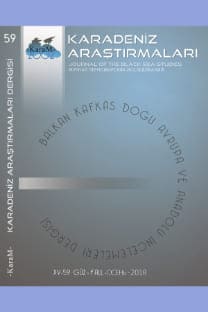Tarihsel Süreçte Rusya'nın Kuzey Kafkasya'yı Kontrol Stratejilerinde Gelinen Aşama: Başarısızlık ve Terör
16’ncı yüzyıldan itibaren imparatorluklarını büyütme emelleri peşinde koşan Ruslar doğuya ve güneye doğru yayılmayı zorunlu görmüşlerdir. Bu bağlamda Kuzey Kafkasya, Asya kıtasının derinliklerine ve sıcak denizlere uzanan mihverleri kontrol edebilen jeopolitik konumu ile Ruslar için çok önemli olmuştur. Hedeflerine ulaşmak için Kuzey Kafkasya’nın işgalini ve kontrolünü amaçlayan Ruslar, bölgenin sömürgeleştirilmesi ve tamamen Rusya ile bütünleştirilmesi yaklaşımları arasında ikilem yaşamışlar; bu ikilem nedeniyle uyguladıkları kontrol stratejileri dönemlere ve devletin başında bulunanların bakış açılarına göre farklılıklar göstermiştir. Ruslar, 16’ncı yüzyılın ortalarından günümüze kadar Kuzey Kafkasya halklarına yönelik olarak; Kozakların kullanılması, Ruslaştırma ve Hıristiyanlaştırma, kültürleşme ile işbirlikçiler yaratma, böl ve yönet, sürgün ve göç ettirme, Rus kökenlileri yerleştirme, baskı ve şiddet politikalarını yaygınlıkla uygulamışlardır. Rusya’nın tarihsel süreçte uyguladığı bu politikalar bölge halklarının bölünmesi ve Rusya’ya karşı güçlü bir ulusal egemenlik mücadelesinin engellenmesi açından kısmi ve dönemsel bir başarılı sağlamasına rağmen, bölgenin tam olarak kontrol altında tutulması hiçbir zaman mümkün olmamıştır. Günümüzde yaygın istikrarsızlık, radikal İslam ve terörle anılan Kuzey Kafkasya’daki sorunların önemli bir bölümü Rusya’nın bölgeyi kontrol stratejilerinden kaynaklanmaktadır.
Anahtar Kelimeler:
Rusya, Kuzey Kafkasya, Kontrol Stratejileri, İstikrarsızlık, Radikal İslam.
Present Stage at Russia’s Control Strategies of the North Caucasus in the Historical Process: The Failure and the Terror
The Russians, in pursuit of ambitions since the 16th century to enlarge their empire, have seen mandatory to expand to the east and to the south. In this context, the North Caucasus, with its geopolitical position which controls the axis extending to the warm waters and the depths of Asian continent has been of great importance for the Russians. In order to achieve the objectives, the Russians, aimed at occupation of and controlling the North Caucasus, have lived the dilemma between the approaches, the colonization of the region and the fully integration of it into the Russia. Because of this dilemma, the control strategies applied have differed in terms of the periods and the State’s elites perspectives. From the mid-16th century to the present day, the Russians have widely practiced the policies of the use of Cossacks, Russification and Christianization, acculturation, collaborators creation, divide and rule, exile and emigration, the placement of Russian descent, policies of oppression and violence against the people of the North Caucasus. Although these policies which have been implemented in the historical process have provided both a partial and a periodical success for the division of peoples in the region and the prevention of a strong struggle for national sovereignty against the Russia, it has never been able to fully keep the region under control. To day, the major part of the problems in the North Caucasus which is called with common instability, radical Islam and terrorism is due to the Russia’s control strategies.
Keywords:
Russia, North Caucasus, Control Strategies, Instability, Radical Islam,
___
- BOBROVNIKO Vladimir. “Islamophobia and religious legislation in post-Soviet Daghestan”, Report of the OSCE Conference on the Role of Freedom of Religion and Belief in a Democratic Society: Searching for Ways to Combat Terrorism and Extremism, Baku, Azerbaijan, 10–11 Oct. 2002.s.66http://www.osce.org/item/878.html(30.01.2013) BROXUP Marie Benningsen. The North Cacasus Barrier, St. Martin’s Pres, USA, 1982. COLARUSSO John. “People of Caucasus”, Encyclopedia of Cultures and Daily Life, (Ed) Pepper Pike, Eastword Publications, USA, 2009. http://www.circassianworld.com/colarusso_2.html (002013) CONSTANCE A. Phlipot. “The North Caucasus: Russian Roulette on Europe’s Borders”, Parameters, Vol. 40, No. 2, Summer 2010, s.87-100. Federal Law No. 114–FZ, The Law on Counteracting Extremist Activity, 25 July 2002. http://www.legislationline.org/documents/id/4368(03.02.2013) GAMMER Moshe. The Lone Wolf and the Bear: Three Centuries of Chechen Defiance of Russian , Hurst and Company, UK, 2006. HILL Fiona. “Russia’s Tinderbox: Conflict in the North Caucasus And its Implications for The Future of the Russian Federation”, Occasional Paper
- ISSN: 2536-5126
- Yayın Aralığı: Yılda 4 Sayı
- Başlangıç: 2004
- Yayıncı: Osman Karatay
Sayıdaki Diğer Makaleler
Karadeniz'de Âyanlar ve Denizcilik
The diplomatic maneuvers of Turkey in World War II
Harnâme'nin söz dizimi özellikleri
H.1131-1132/M.1718-1720 Tarihli Amasya Şer'iyye Sicilinin Tanıtımı ve Fihristi
M. Seyfettin EROL, MEHMET ŞAHİN
